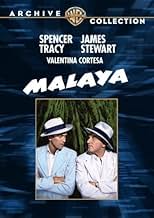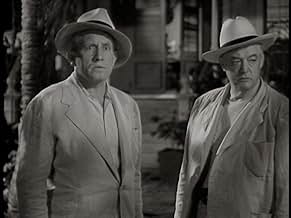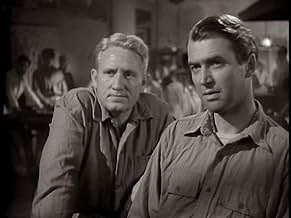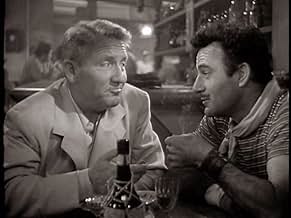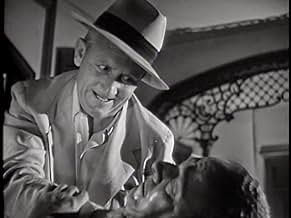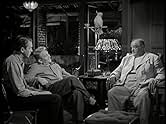IMDb RATING
6.5/10
1.6K
YOUR RATING
Newspaperman Royer convinces government officials of a plan to obtain rubber by smuggling it out from under the Japanese. Carnahan is let out of prison to help.Newspaperman Royer convinces government officials of a plan to obtain rubber by smuggling it out from under the Japanese. Carnahan is let out of prison to help.Newspaperman Royer convinces government officials of a plan to obtain rubber by smuggling it out from under the Japanese. Carnahan is let out of prison to help.
- Director
- Writers
- Stars
- Awards
- 2 wins total
Valentina Cortese
- Luana
- (as Valentina Cortesa)
Lester Matthews
- Matisson
- (scenes deleted)
Joel Allen
- Federal Agent
- (uncredited)
Besmark Auelua
- Henchman
- (uncredited)
George M. Carleton
- Small Businessman
- (uncredited)
Silan Chan
- Malay Girl
- (uncredited)
Spencer Chan
- Chinese Shipmaster
- (uncredited)
Joseph Crehan
- Businessman with Pipe
- (uncredited)
- Director
- Writers
- All cast & crew
- Production, box office & more at IMDbPro
6.51.5K
1
2
3
4
5
6
7
8
9
10
Featured reviews
not very good and terrible miscasting
Even with a better cast, this would not have been much of a film. On the surface it looks like it will be some sort of action film, with spies going into enemy territory to steal, or rather negotiate on the black market for, essential supplies. But there's little intrigue and very little action. Most of the scenes are simply characters sitting in chairs talking to one another. The surprise at the very end of the film is so far-fetched as to undercut the credibility of nearly everything else. The love story involves two people who have no reason to be attracted to one another. There are elements of Casablanca here, set in a country occupied by the enemy, a nightclub owner consorting with an enemy officer, the gambling being fixed by the owner to pay someone he wants to do a favour to, and a cynic acquiring higher ideals; but it's all a very pale imitation of Casablanca. Some comments suggest that there is something "noirish" about the film. Well. it's in black and white, but it does not have the requisite sense of evil and foreboding.
But the biggest failure is in the casting. James Stewart is supposed to play a sour, hard-bitten, cynical operator who finds a little patriotism late in life. But Stewart can't help coming across as a nice guy. He may speak the tough words, but the tone is wrong. His eyes shift in that self-deprecating way of his, he carries himself in that modest way of his, and he just doesn't come off as the character he is supposed to be playing. When his partner is punching someone over and over in the face, Stewart looks repelled by the brutality. Spencer Tracy is probably even worse in his role as a tough jailbird who is let out of Alcatraz to help in the mission. He looks old; his figure is dumpy, his way of moving is slow. He threatens a man, but he doesn't seem very scary. (DeNiro would know how to do that.) He is the romantic interest of a nightclub singer who is crazy over him, yet he's way too old for her and doesn't have anything of the sort of animal magnetism that might make him believable as her lover. In fact, to be honest, there were moments when Tracy looked like he couldn't act. The Japanese have been beating him, trying to get him to talk; Tracy frowns a little but registers no pain, no discomfort, no fear; he shakes it off and then looks comfortable. When he dumps his girlfriend to keep her safe, his face shows nothing.
I forced myself to watch to the end because I have an interest in Malaya. On its own terms, this movie would have lost me long before the mid-way point.
But the biggest failure is in the casting. James Stewart is supposed to play a sour, hard-bitten, cynical operator who finds a little patriotism late in life. But Stewart can't help coming across as a nice guy. He may speak the tough words, but the tone is wrong. His eyes shift in that self-deprecating way of his, he carries himself in that modest way of his, and he just doesn't come off as the character he is supposed to be playing. When his partner is punching someone over and over in the face, Stewart looks repelled by the brutality. Spencer Tracy is probably even worse in his role as a tough jailbird who is let out of Alcatraz to help in the mission. He looks old; his figure is dumpy, his way of moving is slow. He threatens a man, but he doesn't seem very scary. (DeNiro would know how to do that.) He is the romantic interest of a nightclub singer who is crazy over him, yet he's way too old for her and doesn't have anything of the sort of animal magnetism that might make him believable as her lover. In fact, to be honest, there were moments when Tracy looked like he couldn't act. The Japanese have been beating him, trying to get him to talk; Tracy frowns a little but registers no pain, no discomfort, no fear; he shakes it off and then looks comfortable. When he dumps his girlfriend to keep her safe, his face shows nothing.
I forced myself to watch to the end because I have an interest in Malaya. On its own terms, this movie would have lost me long before the mid-way point.
7jhkp
Little-known chapter of WWII history
This is a good, not great, action-adventure picture based on the true account of how very necessary rubber was gotten out of Malaya, under the nose of the Japanese, for the Allied war effort in World War Two.
Spencer Tracy and James Stewart are teamed as a two-fisted con (sprung from Alcatraz for the job) and a hard-bitten reporter recruited by American intelligence (represented by John Hodiak).
There's some action, some atmosphere, some romance. It's not an exciting film, really, but the premise is unusual enough, and with some effort on my part, I stayed with it, and felt it had a decent payoff.
Like a lot of other MGM films of the time, the entire foreign locale was recreated on the back lot and the sound stages of the studio. You may recognize the river area and other locations from earlier films (Tarzan films, for example).
I'm not sure I bought Tracy as the tough nut, Carnahan. At least, not at his age. (He did sometimes play these kinds of roles much earlier in his career.) Here, I would rather have seen Clark Gable. The lines, the attitudes would have suited him better.
Jimmy Stewart doesn't really seem ideally cast, either. He's very good, but he's not exactly right.
Sydney Greenstreet, Valentina Cortesa, Gilbert Roland, Richard Loo and Lionel Barrymore round out the cast.
Though not a thrill a minute, Malaya is at least a fairly intelligent picture that tells a little known story of WWII heroism.
Spencer Tracy and James Stewart are teamed as a two-fisted con (sprung from Alcatraz for the job) and a hard-bitten reporter recruited by American intelligence (represented by John Hodiak).
There's some action, some atmosphere, some romance. It's not an exciting film, really, but the premise is unusual enough, and with some effort on my part, I stayed with it, and felt it had a decent payoff.
Like a lot of other MGM films of the time, the entire foreign locale was recreated on the back lot and the sound stages of the studio. You may recognize the river area and other locations from earlier films (Tarzan films, for example).
I'm not sure I bought Tracy as the tough nut, Carnahan. At least, not at his age. (He did sometimes play these kinds of roles much earlier in his career.) Here, I would rather have seen Clark Gable. The lines, the attitudes would have suited him better.
Jimmy Stewart doesn't really seem ideally cast, either. He's very good, but he's not exactly right.
Sydney Greenstreet, Valentina Cortesa, Gilbert Roland, Richard Loo and Lionel Barrymore round out the cast.
Though not a thrill a minute, Malaya is at least a fairly intelligent picture that tells a little known story of WWII heroism.
The Great Rubber Shortage
Malaya may seem a fantastic tale, but the story actually has quite a bit of truth to it. When World War II broke out the Japanese quickly conquered most of the rubber producing areas of the world. The modern mechanized army does run on rubber and both the USA and Germany developed types of synthetic rubber to be used.
My mother told me during World War II there were all kinds of drives for recyclable material and among the most valuable was rubber. People contributed all kinds of old tires for the war effort.
Lionel Barrymore plays the real life Manchester Boddy who was publisher of the Los Angeles Daily News who was the prime mover in the scheme you see portrayed here in Malaya. Though this story is fictional, the need for rubber in the USA was critical at the time and there was in fact a rubber smuggling operation going on.
Spencer Tracy before he came to MGM played just the kind of two fisted action heroes at Fox which was his original studio. He expressed an interest in doing this kind of film for old time sake and got cast in it. He really isn't poaching on Humphrey Bogart's territory these were the kind of roles he originally did in film while Bogey was playing hoods over at Warner Brothers.
Because the script called for a buddy team of heroes, James Stewart was approached and he even conceded top billing to Tracy. According to the Films of James Stewart, he admired Tracy as an actor so much that he was grateful just for the opportunity to work with him again. In fact Stewart's first film role was in Murder Man, a film that starred Spencer Tracy back in 1935.
With the two of these big stars in the leads, MGM was able to recruit a really outstanding group of players like John Hodiak, Valentina Cortese, Roland Winters, Richard Loo, the aforementioned Lionel Barrymore and my two favorites Gilbert Roland and Sydney Greenstreet.
Roland was shortchanged though. Watching Malaya I could tell his role as Tracy's adventurous friend was left on the cutting room floor. But even a little Gilbert Roland is always a pleasure to watch.
This was Sydney Greenstreet's last film and in it he essentially reprises the part of Ferrari in Casablanca. He's got the best lines in the film and his scenes with his cockatoo are classic. As he says, he's just a saloon keeper with an access to gossip. Which gets put to very good use.
Stewart the idealist, Tracy the cynical realist. Too bad they didn't work together more.
My mother told me during World War II there were all kinds of drives for recyclable material and among the most valuable was rubber. People contributed all kinds of old tires for the war effort.
Lionel Barrymore plays the real life Manchester Boddy who was publisher of the Los Angeles Daily News who was the prime mover in the scheme you see portrayed here in Malaya. Though this story is fictional, the need for rubber in the USA was critical at the time and there was in fact a rubber smuggling operation going on.
Spencer Tracy before he came to MGM played just the kind of two fisted action heroes at Fox which was his original studio. He expressed an interest in doing this kind of film for old time sake and got cast in it. He really isn't poaching on Humphrey Bogart's territory these were the kind of roles he originally did in film while Bogey was playing hoods over at Warner Brothers.
Because the script called for a buddy team of heroes, James Stewart was approached and he even conceded top billing to Tracy. According to the Films of James Stewart, he admired Tracy as an actor so much that he was grateful just for the opportunity to work with him again. In fact Stewart's first film role was in Murder Man, a film that starred Spencer Tracy back in 1935.
With the two of these big stars in the leads, MGM was able to recruit a really outstanding group of players like John Hodiak, Valentina Cortese, Roland Winters, Richard Loo, the aforementioned Lionel Barrymore and my two favorites Gilbert Roland and Sydney Greenstreet.
Roland was shortchanged though. Watching Malaya I could tell his role as Tracy's adventurous friend was left on the cutting room floor. But even a little Gilbert Roland is always a pleasure to watch.
This was Sydney Greenstreet's last film and in it he essentially reprises the part of Ferrari in Casablanca. He's got the best lines in the film and his scenes with his cockatoo are classic. As he says, he's just a saloon keeper with an access to gossip. Which gets put to very good use.
Stewart the idealist, Tracy the cynical realist. Too bad they didn't work together more.
rather full time passer--salvaged only by a few decent performances
If this movie did not have Jimmy Stewart and Spencer Tracy, the film wouldn't have even merited a score of five. It was a very uninspiring and forgettable wartime film made several years after the war actually ended. It just seemed like all the energy was missing from the film. In fact, about the only energy came from Sidney Greenstreet's pet bird--now that bird can act! Another problem with the film is the idea of casting Spencer Tracy in the role of a selfish, devil-may-care smuggler in Alcatraz at the beginning of the film. The believability of the performance didn't improve once he made it to Malaya. This is actually the sort of role I might have expected for Clark Gable or maybe even Errol Flynn (yes, I know he was with a different studio), but for Tracy, an actor who often was cast as the priest or nice guy, it just wasn't terribly convincing. Plus, he just acted too nice to be as seedy as they described him as being.
In the end, the only interesting thing about this film is how so much money was spent on the cast and so little bang was achieved for MGM's buck. This is purely a time-passer or film for those devotees of Stewart or Tracy.
In the end, the only interesting thing about this film is how so much money was spent on the cast and so little bang was achieved for MGM's buck. This is purely a time-passer or film for those devotees of Stewart or Tracy.
decent war film
Spencer Tracy and James Stewart preside over a terrific cast in "Malaya," a 1949 film also starring Valentina Cortese, Sydney Greenstreet, John Hodiak, Lionel Barrymore, Roland Winters and Gilbert Roland.
This is a fictional account of a very real situation involving the shortage of rubber during World War II. Japan really dominated the countries that had the rubber, and there was smuggling of rubber to the U.S. The situation involving Tracy and Stewart, however, never happened.
Tracy plays a con named Carnahan, whom the government releases from Alcatraz in order to spearhead this project, and Stewart plays John Royer, a former reporter with a shady enough past that the government (represented by John Hodiak) thinks he's a good bet to go into Malaya and smuggle tons of rubber out of that country and pay with gold. Carnahan knows the country like the back of his hand and has the connections. He and Royer pose as Irish sailors looking for work in order to get around a suspicious Colonel Tomura (Richard Loo) while they are helped by an old friend of Carnahan's, The Dutchman (Sydney Greenstreet). Cortese has the Dietrich role, that of a singer in love with Carnahan.
There are some exciting scenes in this film, and it holds one's attention. One of the best performances comes from Gilbert Roland, who leads the smugglers handpicked by The Dutchmen. He's very convincing.
As for Tracy and Stewart, well, although Tracy started out in tough guy Wallace Beery roles, 1949 was a little late for him to be taking them up again. Actually Hodiak would have been good, or Bogart, or John Wayne, Jimmy Cagney, someone along those lines. I thought Stewart was very good and that the two of them made an effective team. Someone said he came off as a nice guy. I thought he did cynic and hardboiled well. You can be cynical and hardboiled and averse to physical violence.
All in all, pretty good.
This is a fictional account of a very real situation involving the shortage of rubber during World War II. Japan really dominated the countries that had the rubber, and there was smuggling of rubber to the U.S. The situation involving Tracy and Stewart, however, never happened.
Tracy plays a con named Carnahan, whom the government releases from Alcatraz in order to spearhead this project, and Stewart plays John Royer, a former reporter with a shady enough past that the government (represented by John Hodiak) thinks he's a good bet to go into Malaya and smuggle tons of rubber out of that country and pay with gold. Carnahan knows the country like the back of his hand and has the connections. He and Royer pose as Irish sailors looking for work in order to get around a suspicious Colonel Tomura (Richard Loo) while they are helped by an old friend of Carnahan's, The Dutchman (Sydney Greenstreet). Cortese has the Dietrich role, that of a singer in love with Carnahan.
There are some exciting scenes in this film, and it holds one's attention. One of the best performances comes from Gilbert Roland, who leads the smugglers handpicked by The Dutchmen. He's very convincing.
As for Tracy and Stewart, well, although Tracy started out in tough guy Wallace Beery roles, 1949 was a little late for him to be taking them up again. Actually Hodiak would have been good, or Bogart, or John Wayne, Jimmy Cagney, someone along those lines. I thought Stewart was very good and that the two of them made an effective team. Someone said he came off as a nice guy. I thought he did cynic and hardboiled well. You can be cynical and hardboiled and averse to physical violence.
All in all, pretty good.
Did you know
- TriviaSydney Greenstreet's final film.
- GoofsOne scene features wild chimpanzees. Chimps are natives of Africa, not Malaya.
- Quotes
John Royer: You have to remember, this guy's a German.
Carnaghan: Yeah, but he's a greedy man, and greed has a nationality all its own.
- ConnectionsEdited from They Were Expendable (1945)
- SoundtracksBlue Moon
(uncredited)
Written by Richard Rodgers and Lorenz Hart
Performed by Valentina Cortese (as 'Luana'), also whistled by James Stewart
- How long is Malaya?Powered by Alexa
Details
Box office
- Budget
- $2,396,000 (estimated)
- Runtime
- 1h 38m(98 min)
- Color
- Aspect ratio
- 1.37 : 1
Contribute to this page
Suggest an edit or add missing content

